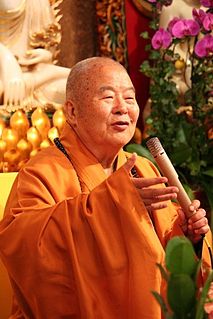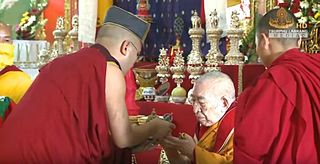A Quote by Hsing Yun
Tolerance is a form of generosity and it is a form of wisdom. There is nothing anywhere in the Dharma [Buddhist scriptures] that should ever lead anyone to become intolerant. Our goal as Buddhists is to learn to accept all kinds of people and to help all kinds of people discover the wisdom of the teachings of Shakyamuni Buddha
Related Quotes
There are several realms which ordinary persons do not perceive. Because they cannot see them, that doesn't mean they don't exist. One of these realms is the sambhogakaya that can only be visited by highly realized Bodhisattvas. In the pure realm of the sambhogakaya, the Dharma is continuously taught. One sambhogakaya realm is Tushita, which is presided over by the next Buddha, the Maitreya Buddha. Buddha Shakyamuni dwelled there before coming to earth to give Dharma teachings.
Unlimited tolerance must lead to the disappearance of tolerance. If we extend unlimited tolerance even to those who are intolerant, if we are not prepared to defend a tolerant society, then the tolerant will be destroyed, and tolerance with them. We should therefore claim, in the name of tolerance, the right not to tolerate the intolerant.
Only in the West did a philosophy develop that was not only no longer the love of wisdom but went so far as to deny the category of wisdom as a legitimate form of knowledge. The result was a hatred of wisdom that should more appropriately be called ‘misosophy’ (literarily hatred of Sophia, Wisdom) rather than philosophy.
The kinds of people we need in government are precisely the kinds of people who are most reluctant to go into government -- people who understand the inherent dangers of power and feel a distaste for using it, but who may do so for a few years as a civic duty. The worst kind of people to have in government are those who see it as a golden opportunity to impose their own superior wisdom and virtue on others.
I think it would help if, when people are first ordained, they underwent a period of strict training, maybe for several years. During this time they would learn basic Buddhist philosophy in a monastic community where all the teaching and training was directed toward living a perfect monastic life and wasn't channeled out to fit into the lay life - which is what usually happens in Dharma centers where the teachings are directed toward how to live the Dharma in your everyday life.
I don’t think it would have all got me quite so down if just once in a while—just once in a while—there was at least some polite little perfunctory implication that knowledge should lead to wisdom, and that if it doesn't, it's just a disgusting waste of time! But there never is! You never even hear any hints dropped on a campus that wisdom is supposed to be the goal of knowledge. You hardly ever even hear the word 'wisdom' mentioned!
I am afraid I am one of those people who continues to read in the hope of sometime discovering in a book a single—and singular—piece of wisdom so penetrating, so soul stirring, so utterly applicable to my own life as to make all the bad books I have read seem well worth the countless hours spent on them. My guess is that this wisdom, if it ever arrives, will do so in the form of a generalization.
I often say that I'm a Buddhist-Episcopalian. I say that partly to annoy people.I like to annoy people who think that a religion can contain the whole truth. No religion, it seems to me, contains the whole truth. I think it's mad to think that there is nothing to learn from other traditions and civilizations. If you accept that other religions have something to offer and you learn from them, that is what you become: a Buddhist-Episcopalian or a Hindu-Muslim or whatever.

































